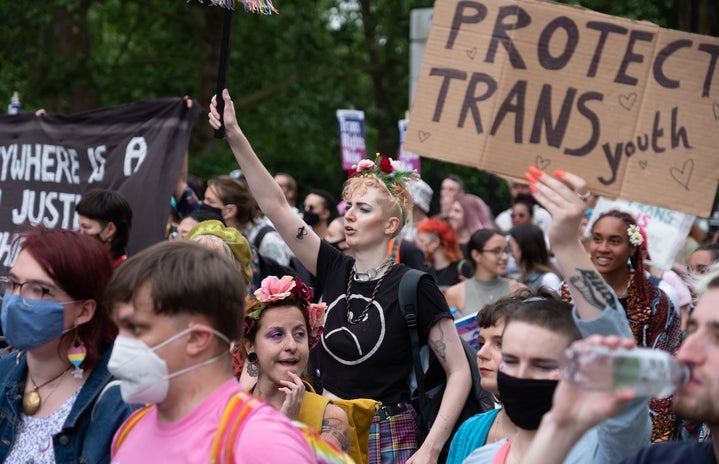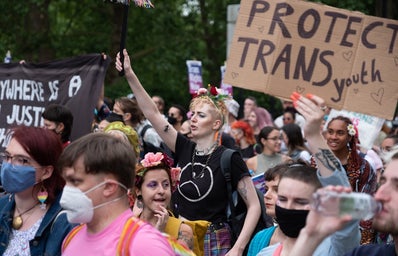Last Thursday evening, a group of students marched in conjunction with ‘Reclaim the Night’, an annual march for women and non-binary people aimed at taking a stand against gendered and sexual violence by reclaiming spaces traditonally stolen from them.
Reclaim the Night marches are not a recent phenomenon. Starting in 1977, the marches began in large British cities such as Leeds, Manchester, London and Bristol and quickly spread to become a nationwide event. The marches rapidly gained significance following the “Yorkshire Ripper” murders in and around Leeds in which a man targeted and murdered sex workers in the area. The police response to these murders was minimal, placing the responsibilty on women to stay inside and not go out at night, rather than hold men accountable for this breed of violence. The marches were sparked by feminist anger at this response. Bearing signs reading “No Curfew on Women- Curfew on men”, the marches were a resistance to show that women should feel able to walk anywhere and should not be the ones condemned by male violence.
Whilst it is important to remember the history behind the marches, reminding women and non-binary people that they are not alone and part of a larger community, it is, overall, sad to think that these marches still need to continue, more than forty years after they began. Today, the march has come to represent all marginalised communities threatened by male violence at night, taking a stand against misogyny, trans misogyny and racism. The message today, fuelled by frosty years of anger, is clear: not enough has been done. These marches, becoming a consistent event within feminist communities, only continue because not enough has been done to change how marginalised genders are treated in public spaces.
Thursday evening was my first time participating in a march with “Reclaim the Night”. I felt the experience was an important one to take part in this year, following the recent rise of headlines in the past few years of violence and injustices enacted against women and non-binary people. It is easy for newspapers to make cases seem like one-off occasions and place distance between the general reader and the victim. But the harsh reality is that none of these cases are too far from our own reality. We still feel a need to tell their friends to text to make sure they got home safely. We still choose routes home that avoid dark avenues, corners or leave us vulnerable. We still hold keys in our hands, hide pepper-spray in our pockets and check that our rape alarm works. These are not the actions that should be taken against sexual violence, the action should come from the authorities and men themselves to enact change. The realisation that I, like so many other women and non-binary people, still feel a need to prevent and preempt dangerous scenarios when walking home at night was enraging to think about, so I decided to make my anger heard and march alongside those who felt the same.
The march began outside of the Union, where I was promptly given a hand written sign reading “change the culture, reclaim the night” to bear during the march. Speeches from those representing femsoc, the LGBTQ+ community and gender rights at St Andrews enlivened the crowd. For a small town of only three streets, where everyone seems to know everyone and community is central, it was shocking to hear that minority groups and genders still feel threatened or unsafe when walking at night. Our energy picked up as chants demanding an end to the patriarchy and sexual violence gave as a channel to express our frustration towards a system currently designed to benefit cis, white men. The march started along Bell Street, drawing much attention from those living there as faces emerged from windows to get a better look at the commotion. We carried on along South Street before snaking along both Market Street and North Street towards the Quad, our final destination. Although somewhat sheepish at first, my chants quickly grew in volume and intensity as I began to feel both empowered and encouraged by those around me.
Generally, those who passed us or stopped to watch were supportive with many picking up the chants or cheering as we walked. Nevertheless, there were some members of the public who were less receptive, shouting for us to “shut the f*ck up” or yelling that they had heard it all before. Evidently they had heard but not listened. Whilst this reaction was not unexpected, it was somewhat shocking, and only provided me with clarity that this march, unfortunately, is still as important and relevant for women and non-binary people today as it was in the 1970s.
Marching in support of the ‘Reclaim the Night’ movement was an immensely proud moment for me, as it was for many of the other participants. The event was extremely well organised and the members of femsoc running it made it extremely accessible and welcoming to all. The march was informative, emotional and encouraging, creating a sense of community amongst those who went and those who supported it to prove that as scary as the night can be for minority genders, no one is alone in that feeling and change is coming, it’s just taking its time.


